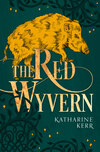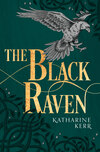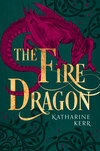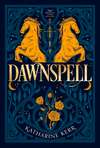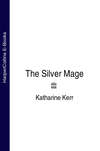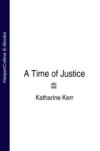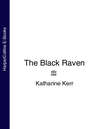Kitabı oku: «The Red Wyvern», sayfa 3
In the high white wall Councilman Verrarc’s outer gate stood open. Niffa walked into a square court, paved with flat reddish stones, where huge pottery tubs stood clumped together to catch rainwater. A pair of big black hounds, lying in a patch of sun, lifted their heads, sniffed at her, then thumped lazy tails. The house itself stood beyond them, a low white structure roofed in thatch. The front door sported a big brass ring. Niffa banged it on the wood, then waited, shifting from foot to foot, until it opened a bare crack. She could just see Magpie, a girl of about her own age, staring back out. Magpie had a pudgy round face, dark eyes, and a thin mouth that always hung a little open.
‘Let me in, Maggi,’ Niffa said. ‘There’s a need on me to see the councilman.’
Maggi considered, tilting her head a little.
‘Come on now, you’d had the knowing of me since we were children! Do let me in, and then fetch the councilman.’
When Magpie’s eyes narrowed, Niffa realized she’d made a mistake by linking two different tasks together. It would take the poor girl a while to sort that out, she supposed. Fortunately, a voice sounded from inside the house, and old Korla, a bent and withered woman who shuffled along in big sheepskin shoes, took over the door from her grand-daughter.
‘Ah,’ Korla said to Niffa. ‘So, you’ve come about that ale?’
‘I have. I do wish to thank your master properly for so fine a gift.’
Giggling to herself, Magpie ran off. Korla led Niffa into the councilman’s hall, a square room with a low beamed ceiling and a floor covered with braided rushes. Below each shuttered window stood a carved chest; in the middle of the room, a table with benches; at the massive hearth, two carved wooden chairs with cushioned seats, and against the wall, three other chairs – a fortune of furniture for a Cerr Cawnen house. Here and there on mantel and table some small silver oddment caught the firelight and glittered. Sitting in one of the chairs, her feet up on a footstool, was Raena, dressed in fine blue cloth and with her hair bound up like a great lady. She acknowledged the servant with a small nod but said nothing to either her or Niffa.
‘I’ll be fetching the master,’ Korla said and shuffled through a side door.
Niffa walked close to the fire and held out her hands to the warmth. She could feel the older woman studying her, but when she looked up and arranged a smile, Raena looked away with a sneer. Perhaps she felt her shamed position – Niffa tried to think kindly about her. After all, Raena had been cast off by her husband for being unfaithful to him with Verrarc. She must have known that every woman in town gossiped about her.
On the hearth a log within the fire slipped, flashing with sparks and a long leap of flame. In the suddenly brighter light Niffa could see Raena’s face clearly: pale, beaded with sweat, and under her eyes lay dark circles as livid as bruises.
‘Be you well?’ Niffa said. ‘Should I be calling your maid to you?’
‘My thanks but no. Tired, I be, not ill.’ Her words slipped out one a time.
‘Very well, then, but I –’
Niffa stopped in mid-sentence, caught by the way Raena was looking at her. The older woman’s dark eyes glittered in the firelight, but her stare was cold, thorough, searching over Niffa as if she were hunting lice upon her cloak. All at once Niffa felt like screaming at her, like slapping her as well and yelling that she should take her filthy self out of Cerr Cawnen forever. She turned and hid her face in the shadows thrown by the fire, but she fancied that she could feel Raena’s cold stare prying at her back.
‘Well, a good day to you, Niffa!’
Verrarc strode in through the side door. He was tall, the councilman, blond and good-looking by most people’s standards, but his blue eyes peered with a winter’s cold, and to Niffa his smiles looked as painted as a wooden doll’s.
‘I trust your mam be well?’ he went on.
‘She does have a rheum, Councillor, though she fares better today than last. I did come in her place to thank you for that splendid gift.’
Briefly his smile turned warm.
‘Most welcome you are to it, and your kin as well. Now, if your mother should need of somewhat, whether medicaments or food, please do ask me for it. I mean that from the bottom of my heart.’
He did, too – Niffa could tell even as she wondered why his very generosity irked her so. She managed a few more polite exchanges, then curtsied and made her glad escape.
As she picked her way down the icy steps that led to the granary and home, she was wondering why she hated Raena so much, and on sight, too. She’d never actually met the woman before that day. Unless she was very badly wrong, Raena hated her as well.
But little could either of them know that their hatred went back hundreds of years to another life, when both of their souls had been closely linked indeed, as mother and daughter in a life so far removed from what they shared at the moment that it would seem to lie in another world – could they ever know of it. And less could they know that the man Raena hated as Rhodry Maelwaedd had been bound up with them in a knot of Wyrd, though he too had lived in another body and another life, back in those distant years.
PART TWO
Deverry, 849
The year 849. The spring brought terrible omens in the sky above the Holy City. A cloud shaped like a dragon flew overhead, and there was lightning. The sky turned the colour of copper, and a huge cloud like a spindle of black wool drew water from Lake Gwerconydd only to spit it out upon the land. So many refugees fled to Lughcarn that the city could not take them all in. High Priest Retyc gave them what food he could gather and sent them further east, where the farmlands had need of them.
The Holy Chronicles of Lughcarn
In the midst of a clamour, Lillorigga, daughter of the Boar clan, sat on a bench in the curve of the wall and wished that she were invisible. The King’s great hall roiled with armed men, standing, talking, sitting, eating, calling out to one another and calling for ale. Spring had come and brought with it the annual muster of the King’s loyal lords and their warbands, but in the two enormous hearths at either side the hall, fires blazed and sent wafts of smoke into the hazy room. The stone walls of the enormous round hall oozed cold, for the attacking sun never made more than a brief sally into the tangled complex of brochs and outbuildings that made up the royal palace of Dun Deverry.
Not that the hall looked particularly royal these days – a hundred long years of civil war had left the King poor in everything but men. Tapestries sagged threadbare and faded on the rough stone walls; straw and torn Bardek carpets lay together on the floor; the tables and benches listed and leaned, all cracked and pitted. The lords and the servants alike ate from wooden trenchers and drank from pottery stoups. Only the King’s own table retained some semblance of royal splendour. From where she sat Lillorigga could just see a page spreading a much-mended and somewhat stained linen cloth over it while others stood by with silver dishes and pewter mugs. Behind the boys came the royal nursemaid with cushions to raise the seat of the royal chair; King Olaen had been born just five summers ago.
Lilli was the King’s cousin – they shared a great-grandmother through the maternal line – and her uncle, Burcan of the Boar, stood as regent to his young highness. Her rank brought her bows and curtsies every time someone passed her bench or looked her way. She answered each one with a nod or a smile, but she hated the way the various lords looked her over, as if they were appraising a prize mare ready for market. Soon her mother would be arranging her betrothal to some son or another of one of the King’s loyal men. She could only hope that when the time came, her husband would treat her decently.
Across the hall a herald called out for the men to make way. A procession of women was descending the huge stone staircase, with at their head Queen Abrwnna, who, older than her royal husband, was almost a woman, no longer a girl. Behind her came her retinue of maidservants and noble-born serving women, who included Lillorigga’s mother, Merodda, a widow and sister to both Tibryn, Gwerbret Cantrae, and Regent Burcan. In the flickering dim light, Merodda looked no older than the young Queen. Her yellow hair lay smooth and oddly shiny, caught by a silver clasp at the nape of her neck. Her skin was the envy of every woman at court: smooth and rosy just like a lass, they said, and her with a marriageable daughter and all! She walked like a lass, too, and tossed her head and laughed with spirit. A marvel, everyone said, how beautiful she is still. If they only knew, Lilli thought bitterly. If they only knew – her and her potions!
At the bottom step Merodda paused, looking over the great hall, then turned to speak to a page before she rejoined the Queen’s retinue at table. When Lilli realized that the page was heading for her, she rose, briefly considered bolting, then decided that if she angered her mother now, she’d only pay for it later. The page trotted over and made her a sketchy bow.
‘Honoured Lillorigga,’ he said, ‘your mother says you’re to come to her chambers when she’s finished eating.’
Lilli felt fear clutch her with cold, wet hands.
‘Very well.’ She just managed to arrange a smile. ‘Please tell her that I’ll wait upon her as she wishes.’
With barely a glance her way he turned and trotted back to the Queen’s table. Lilli saw him speak to Merodda, then take up his station for serving the meal. Lilli herself was supposed to eat at one of the tables reserved for unmarried women of noble birth. Instead she grabbed a chunk of bread from a serving basket as a page carried it by and left the press and clamour of the hall.
Outside the sun was setting, dragging cold shadow over the courtyard, one of the many among the warren of brochs and outbuildings. Lilli hurried past the cookhouse, dodged between storage sheds, and slipped out a small gate into a much bigger court, the next ward out, ringed round by high stone walls that guarded pigsties, stables, cow sheds, a smithy, a pair of deep water wells – everything the dun needed to withstand a siege.
At the gates of this ward someone was shouting. When Lilli saw servants hurry past with lit torches, she drifted after them, but she kept to the shadows. Down at the wall, the torchlight glittered on chain mail and a confusion of men, arguing about who would do what, a debate the captain of the watch finally ended – he ordered his guards to man the winch that opened the enormous iron-bound gates. They creaked open a bare six feet to let an exhausted rider stumble through, leading a muddy horse.
‘Messages for the King,’ he croaked. ‘From the Gwerbret of Belgwergyr.’
Servants rushed to take his horse. Lilli trailed after the messenger and the watch captain as they hurried up to the main broch.
‘Good news, I hope,’ said the captain.
‘Bad,’ the messenger said. ‘His Grace the gwerbret’s lost more vassals to the false king.’
Lilli felt suddenly sick.
She trailed after the messenger and his escort as they hurried to the great hall. By then all the important lords had gathered around the King. On his cushions at the table’s head Olaen, a pretty child with thick pale hair, was eating bread and honey. At either side of him Lilli’s two uncles – Tibryn, Gwerbret Cantrae, and his younger brother, Burcan, the Regent – sat as a matched pair between the King and the rest of the gwerbretion and other such powerful lords who dined at this table. Both of them were handsome men, tall and warrior-straight, with the wide-set blue eyes they shared with their sister, Merodda, but unlike her they showed their age in grey hair and weather-beaten faces.
As the guards hurried up, everyone stopped eating and turned to look. The messenger knelt before the King, then pulled a silver tube out of his shirt and handed it to Olaen with a flourish. Burcan leaned forward and snatched it, then gestured at the man to speak. The great lords huddled around, narrow-eyed and grim. At the Queen’s table the women fell silent and turned, leaning to hear the news. From her distance Lilli could hear nothing of what the messenger said, but a rustle of talk broke out, first at the royal table, then spreading through the great hall: more lords gone over to Cerrmor. With a curt nod, Burcan dismissed the messenger. King Olaen was watching the Regent with eyes full of tears.
Lilli saw her mother turn and leave the Queen’s table, hurry up the staircase, and disappear into the shadows at the top. With a wrench of will, Lilli forced herself to follow. On the far side of the hall, near the stairway, a page was seating the messenger while a serving lass brought him ale. Lilli hesitated, then stopped beside the messenger, who hastily swallowed his mouthful of ale and started to rise.
‘Oh, do sit,’ Lilli said. ‘You must be exhausted. I just wanted to ask you if Tieryn Peddyc of Hendyr’s gone over to the rebels.’
‘Not him, my lady. He’s steady as a stone.’
‘I’m so glad. He’s my foster-father.’
‘Ah.’ The rider smiled briefly. ‘No wonder you wanted to know. He and the Lady Bevyan are in good health and as loyal as ever.’
‘My thanks.’
Lilli hurried away and climbed the staircase. Maybe Bevyan would come to court, then, with her husband when he joined the muster. She hoped – no, she prayed so, as hard as she could to the Lady of the Moon. Merodda had sent her and her wet nurse to Bevyan when Lilli had been a few weeks old; until she’d seen twelve summers, Bevyan had been the only mother she’d known. If only I could have stayed with Bevva – her eyes threatened tears, but she squelched them and at the top of the stairs paused for a moment to catch her breath. The fear clutched at her heart again, but she had nowhere to run or hide. With one last gasp, she hurried down to her mother’s chambers.
Merodda herself opened the door. She was carrying a long taper in a holder, and in the candlelight her face, her hands, glistened like wax.
‘Good. You’re prompt tonight.’
In a pool of candle-light near the chamber windows stood Brour, the man her mother called her scribe – a skinny little fellow, with an oversize head for his body and wispy blond hair, so that at times he looked like a child, especially since his full lips stuck out in a perennial pout. Merodda laid her hand on Lilli’s shoulder and marched her down the length of the room. On the table in front of Brour, among the candles, stood a grinding stone, a chunk of something black that looked like charcoal, and a flagon of water. Apparently the scribe had been making ink, and a prodigious amount of it at that. He put a handful of powder ground from the ink block into a heavy silver bowl, then added water from a pitcher a little at a time, while he pounded and stirred with a pestle.
‘Here she is,’ Merodda said.
Brour put his tools down on the table, then considered Lilli so coldly that she took an involuntary step back. Her mother’s hand tightened on her shoulder. In a hand black with dry ink Brour took the taper from Merodda and held it up to consider Lilli’s face.
‘No one’s going to hurt you, lass,’ Brour said at last. ‘We’ve just got a new trick we’d like you to try.’
‘You have strange gifts, my sweet,’ Merodda said. ‘And we have need of them again.’
For a moment Lilli’s fear threatened to choke her. She wanted to blurt out a no, to pull free and run away, but her mother’s cold stare had impaled her, or so she felt, like a long metal pin pushing into her very soul.
‘Come now!’ Merodda snapped. ‘We women must do what we can to serve the King.’
‘Of course, Mother. Of course I want to.’
‘Of course? Don’t lie to me.’
Lilli blushed and tore her gaze away.
‘But I don’t care if you do or not,’ Merodda went on. ‘Let’s get started, shall we?’
Brour grunted and set the taper down among the others. On the table the candles danced and sent light glinting onto the black pool in the silver bowl. Lilli found herself watching the glints, staring at them, caught by them while her mother’s hand slid from her shoulder to the back of her neck. She felt her head nodding forward, pressed down by the weight of a hand grown suddenly heavy. The ink pool seemed to surge and heave like waves on a black sea that swelled to fill her sight, to fill the room, it seemed, and then her world. As she sank down into the blackness, she heard Merodda’s voice chanting, low and soft, but she could distinguish not a single word. The syllables clanged like brass and seemed to reverberate in her ears, foreign sounds linked into alien words.
In the blackness, a point of candlelight, dancing – Lilli swam toward it but felt her body turn to dead weight, as if she hauled it behind her when she moved. The point brightened, then dilated into a circle of light that she could look through, as if she’d pulled back a shutter from a round window and peered out at the sunny world beyond. From some great distance she heard Merodda’s voice.
‘What do you see, Lilli? Tell us what you see.’
She felt her mouth moving and words slip out like pebbles, falling into the black. In the window things appeared, creatures, vast creatures, all wing and long tails. Around them a bluish light formed and brightened, glinting on coppery scales, blood-red scales, a pair of beasts sleeping, curled next to one another. One of them stirred and stretched, lifting its wings to reveal two thick legs and clawed feet. A huge copper head lifted, the mouth gaped in a long yawn of fangs.
‘Wyverns. I see red wyverns, and now they’re flying.’
‘Good, good.’ Her mother’s voice slid out like drops of oil. ‘Where do you see them?’
‘Over a grassy plain.’
Down from the mountains they swept, their massive wings slapping the air, and to Lilli it seemed that she flew with them while her voice babbled of its own accord. They circled round a meadow where a herd of swine fed, then suddenly stooped and plunged like hawks. Shrieking and cackling they struck. The blood-red wyvern rose, flapping hard, with a big grey boar clutched limp and bleeding in its talons.
In her vision Lilli flew too close. The wyvern’s enormous head swung her way. The black eyes glittered, narrowed, and seemed to pierce the darkness and stare directly at her. Lilli screamed and broke the spell. She staggered, stumbling forward, knocking into the table. A candle tottered and fell with a hiss and a stench into the black ink.
‘You clumsy little dolt!’
Merodda grabbed her by the hair and swung her round, then slapped her with her other hand. Lilli yelped and sank to her knees. Pain burned and crawled on her face.
‘Stop it!’ Brour snarled. ‘She can’t help it. She can’t control the trance.’
Merodda stepped away, but Lilli could hear her panting in ebbing rage.
‘She needs to be trained.’ Brour’s voice had turned calm again. ‘I don’t see why you won’t let me –’
‘We will not discuss this in front of her.’ Merodda leaned down. ‘Oh, do get up!’
Lilli scrambled to her feet.
‘You may go to your chamber,’ Merodda said. ‘Leave us. And if you ever tell anyone what happened here –’
‘Never, I promise. Never.’ Lilli could hear her own voice swooping and trembling. ‘I’ve never told before, have I?’
‘You haven’t, truly.’ Merodda considered her for a long cold moment. ‘You have some wits. Now go!’
Lilli gathered up her long skirts and raced from the chamber. She dashed down the hall, ran into her tiny chamber at the far end, and barred the door behind her. For a long moment she stood in the twilight grey and wept, leaning against the cold wall; then she flung herself down on her narrow bed and fell asleep, as suddenly as a stone dropped from a tower hits the ground.
That same spring evening, at the stillness before the sunset, Lady Bevyan of Hendyr stood at her bedchamber’s narrow window and considered the ward of her husband’s dun. Stone framed her view: the stone sides of the window slit when she looked through, the stone billow of the squat broch tower when she looked down, the stone walls of encircling fort when she looked toward the distant west and the silent gold of an ending day. All her life, stone had meant safety thanks to the civil wars, just as winter had meant peace, despite the snows, the storms, and the ever-present threat of hunger. Only lately had she come to think of stone as meaning imprisonment. Only lately had she come to wonder about a world in which summer, too, might mean peace.
Not that such a world coincided with her world, not yet at least. Below her, deep in shadow, the preparations of war filled the cobbled ward: extra horses, tethered out for want of room in the stables; provision carts, packed for the morrow’s march. Her husband, Tieryn Peddyc of Hendyr, had called in his allies and vassals for the summer’s fighting, defending the true king in Dun Deverry from the would-be usurpers gathering on the kingdom’s southern borders. Or so her husband and his allies always called Maryn, Gwerbret Cerrmor, prince of distant Pyrdon – usurper, pretender, rebel. At times, when she wasn’t watching her thoughts, Bevyan wondered about the truth of those names.
From behind her Bevyan heard a door opening and a soft voice.
‘My lady?’ Sarra, one of her serving women, stepped in the door. ‘Are you unwell?’
‘I’m not, dear.’ Bevyan turned from the window. ‘Just taking a moment’s solitude. I’m trying to make up my mind about going to court. Tell me, do you want to go to Dun Deverry?’
Sarra hesitated, thinking. She’d come to Bevyan as an orphaned girl-child, long enough ago now that grey streaked her dark hair at the temples.
‘Well,’ Sarra said at last. ‘Our place is at Queen Abrwnna’s side, but oh, my lady, I shouldn’t admit such a shameful thing, but I’m ever so frightened of being caught in a siege.’
‘So am I. The Cerrmor men are nearly to our lands, aren’t they? Sometimes I wonder what the summer will bring.’
Sarra laid a hand over her throat.
‘But we mustn’t give up hope yet.’ Bevyan make her voice brisk. ‘The gods will give us the Wyrd they choose, and there’s not a thing we can do about it.’
‘True spoken.’
‘As for things we can do something about,’ Bevyan paused for a sigh, ‘I’m worried about little Lillorigga. She’s the only reason I’ll be going, frankly, if I do go. I keep asking for news of her, but no one ever sends me any.’
‘Well, certainly her mother wouldn’t bother.’ Steel crept into Sarra’s voice. ‘Do you think we could persuade the Lady Merodda to let us bring her daughter back here? For the cleaner air and all. When you had the fostering of her, she thrived, poor child.’
‘Merodda might well be glad to be rid of her. It’s worth a try. I’ll tell you what. Let’s ride with my lord on the morrow, but there’s no reason that we need to spend all summer in Dun Deverry. If things do look grim, the lords will be sending their womenfolk away, anyway.’
‘That’s true. Shall I tell the pages, then?’
‘You should, indeed. We’ll need them to get our palfreys ready, and we need to fill a chest to go into one of the carts. There. I feel better already, with the decision made.’
But Bevyan paused to glance out the window. The sun was setting in a haze that sent long banners of gold across the sky, as if they were the pennons of some approaching army. The traitorous thought returned full-force. What if Maryn’s army ended the war this summer? He’d promised amnesty if he should conquer, promised full pardons even to the lords who’d fought most bitterly against him. What if next summer there would be no march to war?
‘My lady?’ Sarra said. ‘You look so distant.’
‘Do I, dear? Well, perhaps I’ve got a bit of the headache. Let’s go down to the great hall and get somewhat to eat.’
In the great hall lords and riders gathered, standing more than sitting, drinking ale, talking in urgent voices, but they stood out of nerves, not for want of benches, and their voices seemed oddly quiet in the half-empty hall. Bevva ran a quick count of lords: a mere four of them, and each obliged to bring no more than forty men a-piece to augment her husband’s eighty and the gwerbret’s one-hundred-and-sixty. At the head of the table of honour sat her husband’s overlord, Daeryc, Gwerbret Belgwergyr, while Tieryn Peddyc sat to his right and their last living son, Anasyn, stood behind His Grace to wait upon him like a page. No one who saw them together would ever have doubted that Anasyn was Peddyc’s son. They shared a long face, long thin nose, and a pair of deep-set brown eyes, though Peddyc’s hair had turned solidly grey and Anasyn’s was still chestnut. When he saw his wife enter, Peddyc rose, swinging himself clear of the bench and smiling as he strode over to meet her.
‘There you are,’ he said. ‘I’d wondered if you were ill.’
‘Not ill, my love, merely thinking. I’ve decided I’d best ride with you when you go to Dun Deverry.’
‘Good.’ He let his smile disappear. ‘You’ll be safer there. I’m stripping the fort guard.’
Bevyan laid a hand on her throat. She wondered if she’d gone pale – her face felt so suddenly cold.
‘Well, we’ve not lost yet.’ Peddyc pitched his voice low. ‘If the time comes for you and your women to leave Dun Deverry, I’ll send you back with a full escort of men. Don’t worry about that. You’ll need to hold the gates long enough to negotiate a settlement with the Pretender.’
‘I see.’ Bevyan swallowed heavily and freed her voice. ‘As my lord thinks best, of course.’
He smiled and touched her face with the side of his hand.
‘Let’s pray I don’t need to do that kind of thinking, Bevva. Come entertain our gwerbret. You and I will ride to court together, at least, and after that, only the gods know.’
Peddyc looked up, and when Bevyan followed his glance she realized that he was looking at the row of cloth banners in gold and green cloth, faded and stained with age, that hung above the main hearth – the blazons of the Ram from time beyond remembering. She could only wonder if someday soon an enemy hand would rip them down.
‘The omens?’ Merodda said. ‘The omens are hideous.’
‘You sound frightened,’ Burcan said.
‘Of course I’m frightened. I suppose that makes me a poor weak woman and beneath contempt.’
‘I wouldn’t say that.’ Burcan, second son of the Boar clan and Regent to the King, allowed himself a wry twist of a smile. ‘I’d say it makes you sensible.’
Merodda sighed once and sharply.
Close to the mid-watch of the night they were sitting in her private chamber, she in a carved chair by the fire, he in another near the table. The candles burning there were freshly lit, and Brour and his bowl of black ink both had long since been tidied away.
‘I wish I had better news to tell you,’ she went on. ‘But we have an enemy here at court.’
‘I don’t need omens to tell me that. Everyone envies our clan.’
‘This is different. In the omen a red wyvern dropped out of the sky and slew a boar.’
‘What? I wish you wouldn’t speak in riddles.’
‘I thought it was clear enough. The King’s blazon is a green wyvern, and so someone close to but not of the royal family must be plotting to drop down upon us and supplant us.’
Burcan started to speak, then merely stroked his thick grey moustaches while he considered.
‘You’re right,’ he said at last. ‘It’s perfectly clear, now that you’ve explained it. I don’t know why, but I just can’t seem to grasp things like omens.’
‘You don’t need to. You have me.’
They shared a smile. In the hearth the fire showered sparks as a log burned through and fell. Burcan rose, then strode over to take wood from the basket and lay it upon the flames. For a moment he stood watching it burn.
‘Any idea of who this enemy might be?’ he said.
‘Not yet. You’re right about the envy. There are a lot of clans with reason to hate us. I just hadn’t realized how deep the hatred must run.’
‘I’ll think about it. A wyvern, was it? Someone with a touch of royal blood themselves, maybe.’
‘There! You’re beginning to puzzle this out.’
‘Am I? Maybe so. Don’t know if I like it, though. That so-called scribe of yours – are you sure we can trust him?’
‘I don’t know. He came to me for the coin, and if someone offered him more, I can’t swear he wouldn’t change his loyalties.’
‘Thought so. I don’t like the man.’
‘Why?’
‘He comes from the south coast, doesn’t he?’
‘Not truly. He’s from the northern lands, though he did live for some years in Cerrmor.’
‘Still! How do you know he isn’t a Cerrmor spy?’
‘I have ways to tell when someone’s lying, as you know perfectly well. There’s somewhat else, isn’t there?’
Burcan scowled at the floor.
‘I don’t like the way he treats you,’ he said at last.
‘What? He’s always courteous.’
Burcan raised his head and looked at her. His eyes searched her face, probing for some secret. Merodda stood with a little laugh.
‘Don’t tell me you’re jealous of poor Brour.’
‘I don’t like the way he’s always in your company.’
When Burcan rose to join her, she laid one hand flat on his chest and looked up, smiling at him. In a moment he laid his hand over hers.
‘My dear brother,’ she said. ‘He’s little and ugly. You’ve got no reason to vex yourself on his account.’
‘Good. And the moment you think he might turn disloyal, tell me. I’ll have the matter taken care of.’
Travelling with Gwerbret Daeryc’s entourage, his attendant lords and their joined warbands, plus their servants and retainers, was no speedy thing, especially with carts along and a whole herd of horses. Rather than jounce around in a cart with the maidservants, Bevyan wore a pair of her son’s old brigga under her dresses and rode her palfrey, as did Sarra. In the long line of march they travelled just behind the noble lords, although at times Peddyc would drop back and ride beside Bevyan for a few miles. It was pleasant, riding in the spring weather through the ripening winter wheat and the apple trees, heavy with blossoms, so pleasant that Bevyan found herself remembering the first days of her marriage, when she and Peddyc would ride together around his lands, alone except for a page trailing at a discreet distance. They had brought such a shock, those days, when she realized that she’d been married to a man that she would learn to love.
